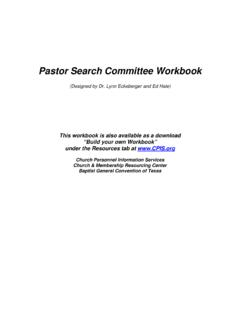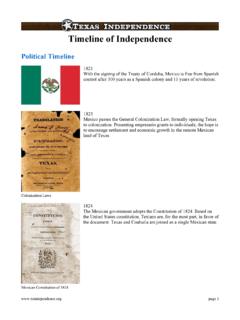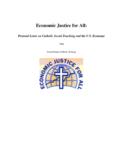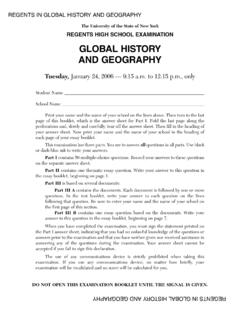Transcription of How to Write a Church Constitution - Amazon Web Services
1 How to Write a Church Constitution 1. A Ministry for Equipping the Saints How to Write A. Church Constitution Roger N. McNamara How to Write a Church Constitution 2. Copyright 2006 by Baptist Mid-Missions Published by the Church Planting and Development Ministry Team of Baptist Mid-Missions, Cleveland, OH 44130-8011. Printed in the United States of America All rights reserved. No part of this publication may be reproduced, stored in a retrieval system or transmitted in any form by any means, electronic, mechanical, photocopy, recording or otherwise, without prior permission of the publisher, except as provided by USA copyright law. (The sample Constitution at the end of this manual may be copied and altered for individual Church use, but may not be sold.). Unless otherwise noted, all Scripture citations are from the King James Version of the Bible, in the public domain.
2 How to Write a Church Constitution 3. Introduction It seems to be a journey without end. Regardless of all of the advances in education and technology we make, in spite of all the tragic testimony of humanity through the centuries, we have yet to come to grips with the reality of Jeremiah 17:9 - that within each of us lies a heart that is not to be trusted because, in the words of the prophet, it is "deceitful above all things, and desperately wicked.". The human heart, even of born-again Bible believers, will lead you into believing something is good or true or right when it really isn't. Proverbs 28:26 puts it bluntly when it says, "he that trusteth in his own heart is a fool." Left to itself the heart of the staunchest Christian, be he a pastor, a missionary, a Church planter or an ordinary believer, will seek dominance and control. Each of us inherently believes that our opinions are superior to those of others.
3 We think we know which option, solution, action, program or decision is best. Rarely do we stop to contemplate the possibility that we might be wrong. The resulting carnage is often witnessed in our churches. Rather than being places of sweet fellowship, peaceful unity, mutual care-giving, and spiritual growth, too many churches resemble battlefields in which we destroy our leaders, shoot our wounded, and take no prisoners. Ample abuse is found in both the pulpit and the pew. Some pastors, ignoring Peter's admonition not to "lord it over God's heritage" (Peter 5:3), exercise dictatorial control over every aspect of the Church 's ministry. They appoint and remove deacons at will. They move funds around as they see fit. They make decisions about programs and properties without seeking counsel or permission from anyone. When they snap their fingers people jump.
4 Everyone knows they are the "boss" who is in control. Nothing happens without their permission. In some churches it is the deacons themselves who have usurped an unbiblical authority and now "run the Church " as they see fit. The pastor is only a hireling who serves as a chaplain to fill both the pulpit and the pew, and to hatch (dedicate babies), match (marry) and dispatch (bury) members of the congregation. Other times churches function with little rhyme or reason. As in the days of old, "every man does that which is right in his own eyes" (Judges 21:25). There are endless business meetings dealing with minutia, turf wars erupt, innovation and creativity are stifled, growth is undermined, and a suffocating inertia settles in like a wet blanket. The cycle is repeated in Church after Church , generation after generation. We never seem to learn that the human heart, even when regenerated, is not to be trusted.
5 It must be regulated. The framers of the Constitution understood that simple fact. So, when they brought this nation to birth they devised a document designed to protect our land against the abuse of power that is so often generated by the human heart. They wrote a manuscript called "The Constitution " that set forth the principles by which this country was to be governed, and instituted a set of checks and balances to minimize potential misuse of authority. What is true of civil government is also true of the local Church . The heart is not trustworthy and must be checked. During the past forty plus years of ministry as a Church planter, pastor, and missionary, this author has seen ample evidence of the depravity of the human heart in the local Church . He has witnessed the anger, the power struggles, the raucous business meetings, and the efforts to seize control.
6 How to Write a Church Constitution 4. In contrast, God's Word admonishes us to "let all things be done DECENTLY and in ORDER" (I. Corinthians 14:40). The only way for that to be done is for people to agree in advance on what is to be done, when it is to be done, and how it is to be done. When written down (that's the only way it will work), the resulting document is known as a " Church Constitution .". Over the past four decades this author has collected many, many Church constitutions. Some are strong, some are weak. Some are good, others are lacking in basic essentials. As a member of the leadership team of Baptist Mid-Missions' North America Church -Planting Ministry Council for nearly fifteen years he has read multiple constitutions presented for review by Church planters all across this country and has written the constitutions for each of his six Church plants.
7 It is with this background and knowledge that the following guide on how to Write a Church Constitution is presented with the prayer that stronger churches will be established on a firmer foundation, and that they will function more biblically with greater unity and harmony to the glory of God. Our desire is to see churches developed that will graduate sooner, finisher stronger, and be better equipped for successful and reproductive ministry. Roger N. McNamara 540) 604 - 1838. 08-06. How to Write a Church Constitution 5. What is a Church Constitution ? Before you can Write a Constitution you must first understand what a Constitution is, what it contains, and what it does. In its simplest form a Church Constitution contains the agreed-upon principles that outline how the Church will function. It sets forth the rules, regulations and requirements for membership and leadership.
8 It describes the administrative procedures by which the Church is to be conducted. Generally, a Church Constitution consists of two or three parts. First, is the Church Covenant. While technically not part of the Constitution , many churches print and bind the Covenant as part of the constitutional packet they distribute to potential members. This document is actually a statement of desire and intent attested to by individual believers when they unite with the Church . Then there is the Constitution itself which contains the fundamental principles and guidelines that govern the Church 's affairs. Among other things, it sets forth the requirements for membership, establishes leadership standards, and describes the form of Church government. Last of all are the Bylaws. These spell out how the organization is structured. They amplify and describe how the principles outlined in the Constitution are to be implemented.
9 They tend to be more specific and detailed, and can be altered more easily. Confusion, however, sometimes results from this arrangement. People have to read back and forth between the Constitution describing the general principle, and the implementation procedures relating to that principle in the Bylaws. Worse still, what is stated in the Bylaws may actually contradict what is stated in the Constitution . As a result, many churches today are doing away with their Bylaws entirely by incorporating them into the body of their Constitutions (so all the information on a given matter is contained in one place). and then developing a Policies and Procedures Manual to describe how those principles are to be implemented. The Constitution is the workhorse of a Church 's governing documents. It deals with the principles, offices, accountabilities, and procedures of congregational life.
10 There are four realities that must be kept in mind as you develop this vital document: A Church Constitution is a Polity Manual "Polity" refers to a particular form or system of governance. It describes where the authority within the group resides and who makes the final decisions. Paul Jackson points out that "the form of Church government is tremendously important for both the harmony and the permanency of the Church and its testimony."1 The landscape is littered with the remnants of lives and churches that have been ruined as a result of an unbiblical form of Church governance. Basically, there are only four major styles of Church polity. 1) Authority resides in the hands of a single leader. His word is absolute. His decisions are final. He controls every aspect of congregational life. He decides how the money is spent, who the leaders will be, and what the Church will or will not do.






